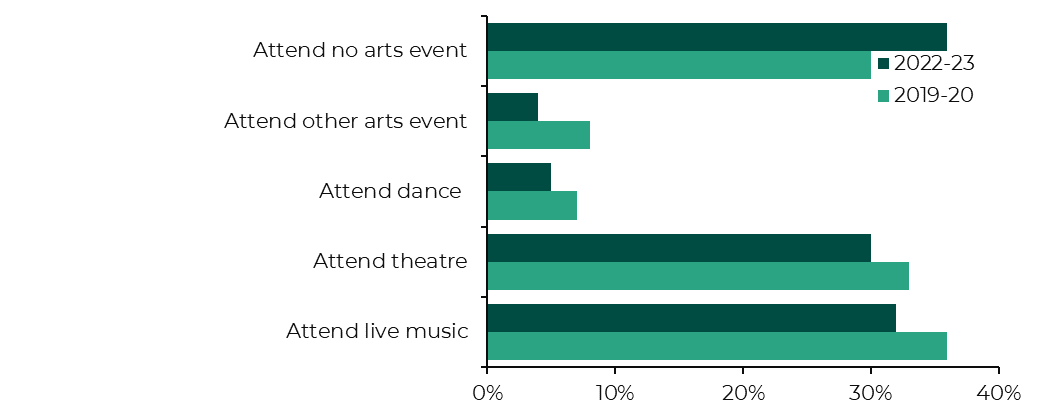On 24 January the Senedd will debate the Culture, Communications, Welsh Language and Communications Committee’s report into the creative industries workforce.
The creative industries are worth more than 5% of Welsh GDP, and have grown faster since the pandemic than the overall Welsh economy. But headline success, driven by a booming screen sector, obscures widespread financial problems in the arts. The Senedd’s Culture, Communications, Welsh Language, Sport and International Relations Committee (“the Committee”) has called for the Welsh Government to make growth fairer and sustainable, and support the sectors that are struggling.
Record growth, unevenly shared
Research by Clwstwr, a creative industries research project, showed that estimated total turnover of Wales’ creative industries hit a record high of £4.2bn in 2022, comprising 4.6% of total turnover in Wales (details of the sub-sectors included within the definition of “creative industries” can be found in the report).
This turnover is significantly higher than some other sectors including agriculture, forestry and fishing, and accommodation and food services.
Comparison of the size of the turnover of the Welsh CCIs to other sectors’ turnover in the Welsh economy (2022 data)

Source: Report update: The size and composition of the creative industries in Wales in 2022 (Clwstwr, 2023)
The creative industries were significantly affected by the pandemic, with the first lockdown seeing a suspension of live shows, concerts, and film and TV production. In 2020 the turnover of the creative industries shrunk by 14%, taking it back to 2013 levels. But 2022 saw a dramatic recovery, with 12% growth in turnover and the sector recording its highest ever figures.
This growth is not evenly shared across the creative industries. Film and television, Professor Justin Lewis told the Culture Committee, “is a huge success story”, with Wales “seen as a kind of global powerhouse in the UK … And all of its growth indicators are really, really strong”. By contrast, he explained “the music industry is very different—all the underlying trends in the music industry are bad”.
The arts are also still struggling with the impact of the pandemic. During normal trading, smaller arts venues operate with tight – if any – profit margins. These are being squeezed with inflation along their supply chains and reduced incomes, as attendances remain below pre-COVID levels.
Arts attendance (2019-20 and 2022-23)

Source: National Survey for Wales
The arts indicators in the National Survey for Wales show that all forms of attendance are down compared to pre-pandemic levels
Music Venues Trust has warned that “2023 will be the worst year for closures” of grassroots venues since the charity was founded in 2014. Across the UK, the number of events hosted at grassroots music venues is down 17% compared to 2019.
“Rapid growth” and the “need for additional people at all levels”
Ffilm Cymru’s Pauline Burt noted that, due to a growth in screen production, “the challenges […] are around rapid growth and need for additional people at all levels”. Gabriella Ricci, from production company Bad Wolf, explained that “a shortage in workforce” meant “we cannot keep up with the demand of the productions we're seeing in south Wales and the south-west Wales region”.
Back in 2019 the previous Senedd’s Culture, Welsh Language and Communications Committee called for the Welsh Government to publish a screen strategy which would include its vision of how Wales’s screen industry can “take responsibility for identifying and mitigating skills gaps”. In September 2022, the Welsh Government announced a creative skills action plan, backed by a £1 million Creative Skills Fund.
ITV Cymru Wales and S4C called for more investment in training and skills, with ITV’s Nia Britton noting “a million isn’t going to go very far”. Tom Ware (Director of Production and Performance at University of South Wales) felt that the problem was not an absence of training, but that training was reactive to short-term needs.
The Committee agreed, calling for the Welsh Government to increase the funding available through the Creative Skills Fund and provide longer term (beyond 2024) funded support for skills development in the creative industries.
The Welsh Government accepted-in-principle the Committee’s recommendation to increase the budget for the Skills Fund, saying that they were aiming for “circa £1m” annual funding, but were “exploring all options to lever additional investment”. They accepted the recommendation to extend the Creative Skills Fund, saying that it is scheduled to run until September 2025.
“Unreasonable working practices … inhibit people from a broader range of social backgrounds”
As well as the challenge in sustaining growth in the screen industries, the Committee heard of challenges in making this growth fair. Tom Ware explained that the, largely freelance, screen workforce could be subject to “unreasonable working practices”. These include long hours and inflexible working patterns. “Those practices”, he felt, “inhibit people […] from a broader range of social backgrounds entering and remaining within the industry”.
At a stakeholder workshop the Committee heard reports of problematic behaviour in the screen industries. These included toxic behaviour in senior creatives, a lack of understanding of how to report bad behaviour, and a small, connected industry making reporting bad behaviour difficult.
The Welsh Government invests in film and TV production through its creative industries division Creative Wales. The Committee felt that the Welsh Government should include with this funding clauses on equality, diversity and inclusion. The Welsh Government responded that “we already require applicants for funding to demonstrate that they have a commitment to diversity, inclusivity and sustainability” and that “plans are in place to further develop funding criteria related to these issues”.
Out of the frying pan…
The arts workforce, by contrast, is struggling to navigate a spiral of decline. “Our sector”, Arts Council of Wales Chief Executive Dafydd Rhys explained, “employs and funds less now than it did pre-pandemic”. The Musicians’ Union’s Andy Warnock noted that “60 per cent of musicians are worse off now compared to last year”.
Since the Committee took evidence, the Welsh Government’s 2024-25 Draft Budget has proposed to cut the Arts Council’s revenue budget by 9%. The Arts Council, which distributes the majority of its funding to the sector, noted that this allocation "is the lowest since 2007/8".
During the inquiry, the Deputy Minister for Arts, Sport and Tourism said the Welsh Government was developing a culture strategy, and that:
“Within that cultural strategy I would expect very much that expectations will be set out very clearly about what cultural organisations look like in Wales and how they employ staff, and what their working conditions are like”.
The Committee recommended that the Welsh Government’s culture strategy should set out “support for developing and sustaining the workforce in the arts and music sectors” and “include provisions on fair pay and working conditions and the use of well-being facilitators”.
The Welsh Government rejected both of these recommendations.
In the Committee’s first meeting with the Deputy Minister in September 2021 she said she was “absolutely committed to creating a cultural strategy”. In the recent Draft Budget Scrutiny Session the Deputy Minister explained that the Welsh Government had a draft strategy, but this now needed revising to reflect the cuts made across the sector in the 2024-25 Draft Budget.
As the sector awaits the culture strategy, it’s unclear what support it will offer to a struggling arts workforce.
Article by Robin Wilkinson, Senedd Research, Welsh Parliament






